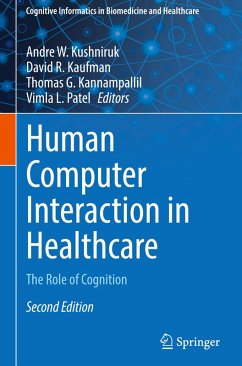This thoroughly updated edition reports on the current state of human computer interaction (HCI) in biomedicine and healthcare, focusing on the cognitive underpinnings of human interactions with people and technology. With health information technologies becoming increasingly vital tools for the practice of clinical medicine, this book draws from key theories, models and evaluation frameworks, and their application in biomedical contexts to apply this to current research in HCI. However, numerous challenges remain in order to fully realize their potential as instruments for advancing clinical care and enhancing patient safety.
There is a general consensus that health IT has not realized its potential as a tool to facilitate clinical decision-making, the coordination of care and improvements in patient safety. Embracing sound principles of iterative design can yield significant dividends. It can also enhance practitioner's abilities to meet "meaningful use" requirements. The purpose of the book is two-fold: to address key gaps on the applicability of theories, models and evaluation frameworks of HCI and human factors for research in biomedical informatics. It highlights the state of the art, drawing from the current research in HCI. It also serves as a graduate level textbook highlighting key topics in HCI relevant for biomedical informatics, computer science and social science students working in the healthcare domain.
Cognitive Informatics for Biomedicine: Human Computer Interaction in Healthcare is indispensable to those who want to ensure that the systems they build, and the interactive environments that they promote, will reflect the rigor and dedication to human-computer interaction principles that will ultimately enhance both the user's experience and the quality and safety of the care that is offered to patients. It is an essential reference to all who are interested in the application of these new techniques within healthcare, from students of informatics through to clinicians, informatics researchers and developers of health IT looking to incorporate them into their day-to-day workflow.
Hinweis: Dieser Artikel kann nur an eine deutsche Lieferadresse ausgeliefert werden.
There is a general consensus that health IT has not realized its potential as a tool to facilitate clinical decision-making, the coordination of care and improvements in patient safety. Embracing sound principles of iterative design can yield significant dividends. It can also enhance practitioner's abilities to meet "meaningful use" requirements. The purpose of the book is two-fold: to address key gaps on the applicability of theories, models and evaluation frameworks of HCI and human factors for research in biomedical informatics. It highlights the state of the art, drawing from the current research in HCI. It also serves as a graduate level textbook highlighting key topics in HCI relevant for biomedical informatics, computer science and social science students working in the healthcare domain.
Cognitive Informatics for Biomedicine: Human Computer Interaction in Healthcare is indispensable to those who want to ensure that the systems they build, and the interactive environments that they promote, will reflect the rigor and dedication to human-computer interaction principles that will ultimately enhance both the user's experience and the quality and safety of the care that is offered to patients. It is an essential reference to all who are interested in the application of these new techniques within healthcare, from students of informatics through to clinicians, informatics researchers and developers of health IT looking to incorporate them into their day-to-day workflow.
Hinweis: Dieser Artikel kann nur an eine deutsche Lieferadresse ausgeliefert werden.








